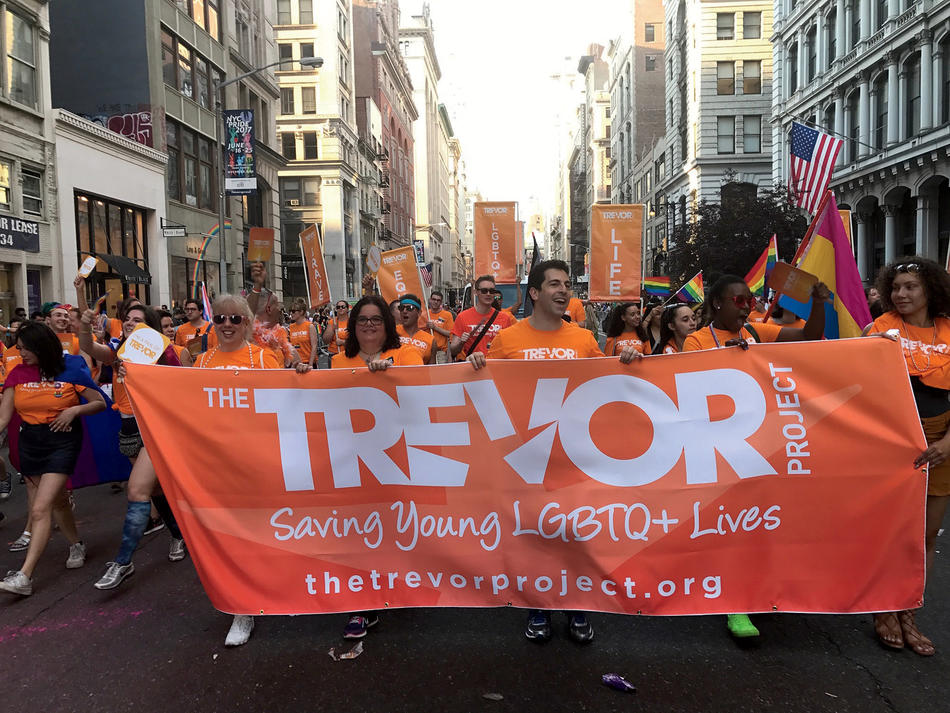“Imagine being a fourteen-year-old trans kid in Texas,” says Amit Paley ’10JRN, ’11BUS, talking about a call he recently took at the Trevor Project, a nonprofit focused on suicide and crisis prevention for LGBTQ youth. “Soon laws could dictate which bathroom you use at school. So, you’re physically uncomfortable and emotionally degraded. And you really need someone you can talk to about it.”
For several years, Paley has been that person. This summer, he became the Trevor Project’s CEO, but before that, as one of the organization’s hundreds of volunteers, he helped to man the twenty-four-hour Trevor Lifeline, offering words of encouragement, suggesting resources, and, mostly, listening. Paley is the first volunteer to lead the organization, and he still takes his weekly four-hour shift on the phones. He couldn’t have started at a more critical time.
“The day after the presidential election, our call volume doubled,” Paley says. “And it’s been getting busier as the reality of the new administration sets in. This May, we received more calls than in any other month in the hotline’s nineteen-year history.”
Paley says that the new administration has been harmful to LGBTQ youth —particularly those who identify as transgender and gender nonconforming — through both its rhetoric and its policy. “Most of these kids grew up in a time that felt hopeful. They saw marriage equality come to fruition, and they felt like things were trending in the right direction,” Paley says. “But the policies of this administration are encouraging bullying and intolerance in communities across America.”
After President Trump announced a ban on transgender troops in the military this past July, for example, the Trevor Project saw another influx of calls. “Even if the policy doesn’t apply directly to a caller, the sentiment behind it matters,” Paley says.
In addition to running the hotlines, the Trevor Project, which serves more than two hundred thousand youth every year, also has an advocacy wing. Paley says that its current priority is fighting what is commonly known as “the bathroom policy” — the reversal of federal protections for transgender students that had allowed them to use the bathroom corresponding with their gender identity. The Trevor Project is also working to ban conversion therapy for LGBTQ youth, and to promote more accurate data collection around LGBTQ suicide and homicide.
For Paley, who came out as gay while an undergraduate at Harvard, the move to a full-time role at the Trevor Project is a significant pivot, and one that feels very personal. He started his career as a journalist with the Washington Post — his work covering the Iraq War was nominated for a Pulitzer Prize — and then moved to the paper’s corporate office. He came to Columbia Journalism School on a Knight-Bagehot Fellowship, which allows cross-disciplinary study in journalism, business, and law. While there, Paley won a second fellowship to continue his studies at the business school. He then worked for several years as a consultant at McKinsey and Company, specializing in health care.
At the Trevor Project, Paley hopes to expand the organization’s reach. Along with the phone hotline, there’s now TrevorText and TrevorChat, where people can connect with volunteers via text and instant messaging, and TrevorSpace, a peer-to-peer social-networking forum. “We want to reach these kids where they’re comfortable, on the platforms that they’re already using,” Paley says.
Though he’s started at a challenging time, Paley says he remains hopeful about the future and inspired by the strength of the LGBTQ community, particularly when he thinks about how much progress has already been made. The Trevor Project was founded in 1998 by three filmmakers who had won an Oscar for a short film about a gay, suicidal teen named Trevor. “They wanted to put the phone number of a crisis hotline at the end of the film so that anyone who felt like Trevor could call and get help,” Paley says. “But there literally wasn’t one to put up. No one was doing this kind of work anywhere. It’s heartbreaking. That’s what gets me out of bed every day.”



